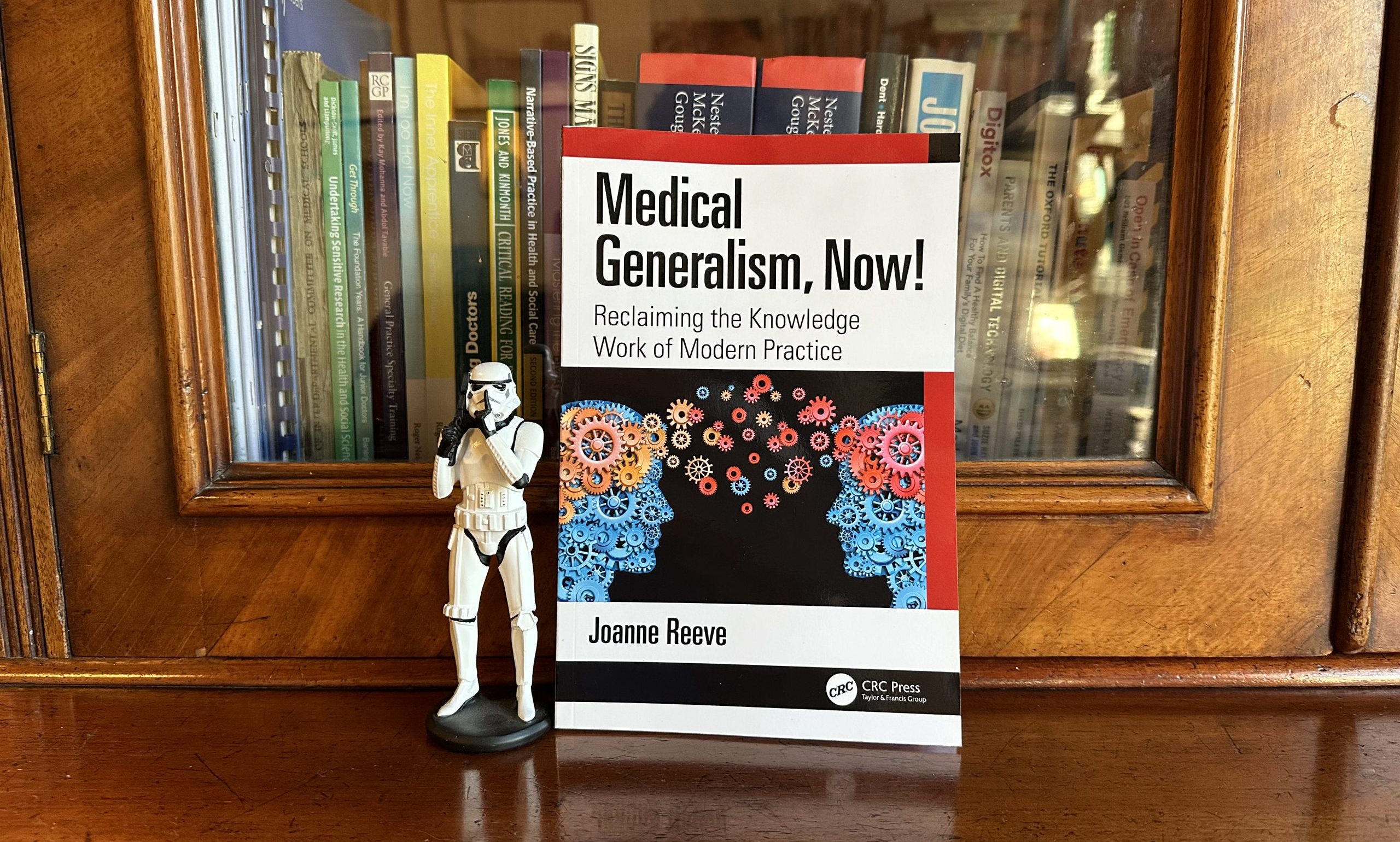 Trisha Greenhalgh is professor of primary care at the University of Oxford. She is on X
Trisha Greenhalgh is professor of primary care at the University of Oxford. She is on X
In 2017 Professor Chris Dowrick edited a book entitled ‘Person-centred Primary Care: Searching for the Self’, with chapters from an all-star line-up of primary care academics including Sally Hull, Stefan Hjorleifsson, Deborah Swinglehurst, Iona Heath and Joanne Reeve. It scrutinised many aspects of person-centred generalist care from its place in the epistemic hierarchy (pretty much at the bottom, of course) to how technology-mediated care complicates it, medically unexplained symptoms require it and neoliberal ideology threatens it.1 Joanne Reeve’s chapter in that book was called ‘Unlocking the Creative Capacity of the Self’. Drawing on work by lived-experience expert Havi Carel, that chapter argued for the importance in generalist care of considering “the self who responds [creatively] to the experience of illness”.2
Now Professor Reeve has released a book of her own, entitled Medical Generalism—Now!, in which she extends her concept of the creative self. The patient responds creatively to illness in a way that is dependent on their individual capabilities and their lifeworld context (which we all know varies in ways patterned by social determinants). We must understand illness through this lifeworld context and support the patient to draw on the resources available and in a way that makes sense and is coherent for them. She challenges a stream of widely-taught research on illness as “biographical disruption”, which downplays the patient’s ability actively to respond and adapt to such disruption. And she argues that the fundamental challenge for the contemporary primary care clinician is to honour the patient’s creative abilities and provide the kind of flexible, tailored care that allows them to navigate an often hostile system effectively as they live with and through illness.
…the fundamental challenge for the contemporary primary care clinician is to honour the patient’s creative abilities and provide the kind of flexible, tailored care that allows them to navigate an often hostile system effectively as they live with and through illness.
If Dowrick’s edited volume was the theoretical benchmark on generalist primary care, conceptualised at an academic retreat and engaging vigorously with topics from the philosophy of complexity to the ontology of consciousness, Reeve’s new book is more a wade mecum for the thinking clinician who wishes to deliver such care. That is not to say it is theory-light—Reeve is an academic of some distinction fluent in normalisation process theory and Carel, from whom she takes inspiration, is a professor of philosophy as well as someone living with life-changing illness—but the book is written primarily from the perspective of an inner-city GP who has delivered and fought to defend generalist care for several decades.
The hierarchical, disease-oriented and narrow kinds of knowledge beloved of evidence-based medicine are all well and good, in their place. They often serve specialist medicine well. But in the down and dirty of front-line inner-city primary care, patients’ needs are unique and complex and few can be managed solely on the basis of what Reeve calls “external disease knowledge”. Rather, in such circumstances, quality care rests more on what she calls “inductive foraging”—seeking, first and foremost, a deep and contextualised understanding of who the patient is (rather than what disease they’ve got) and what challenges they face, drawing together multiple kinds of knowledge to get a better handle on the unique case, and then reasoning abductively to explore what resources and support might help the patient and their family meet their priority challenges. Solutions don’t come in the form of definitive randomised controlled trial results; they are co-produced by patient and clinician and continually adapted through trial and error over the course of the long-term clinical relationship.
Whilst primary care clinicians have long viewed this kind of care as the defining feature of their role, now may not be a good time to ask them to deliver it, given the current pressures (such care is not a political priority and incentives are stacked against it). But now (or to use the syntax of the book’s title, Now!) is precisely the time we must defend and deliver generalist care, because so much is at stake.
To that end, Reeve suggests not merely that we hone and use our generalist wisdom but also that we create “wise places”—that is, practices that can support “expert generalist knowledge work”. You can probably imagine what you’d need to get rid of in your own practice to free you up to do your generalist job justice (e.g. get rid of task fragmentation, develop staff and teams, promote learning organisation values, proactively assess and get to know people with complex needs, align whole teams to address the needs of such patients, practice and reward “knowledge foraging”).
Reeve also has a chapter on “wise systems” in which she takes aim at the New Public Management and other neoliberal perverse incentives. She fires a warning shot at the National Institute for Health and Clinical Excellence which, as we all know, can get above itself at times with its guidelines and missives. Rules of thumb for wise systems include (I paraphrase) ‘draw critically and judiciously rather than mechanically and technocratically on guidelines’; ‘push back on daft policy must-dos’ and ‘create space for transformational learning’.
Reeve’s new book is more a wade mecum for the thinking clinician who wishes to deliver such care.
You’ll find a lot of the traditional ideas and arguments around medical generalism in this book (including brief mention of Ian MacWhinney’s brilliant writing on the topic, Iona Heath’s gatekeeper model, Gabbay and le May’s mindlines, and Engel’s biopsychosocial model). You’ll also find dozens of diagrams — triangles, squares, rectangles, diamonds, and circles in varying degrees of overlap to depict a multitude of models of the person, the relationship, the evidence, the organisation, the care vision, the system, and more. Personally, I could have done with fewer such diagrams and more rich narratives, but younger readers preparing for exams might like all the pictures.
Would I recommend this book over the Dowrick edited volume? For a PhD student no (I think the earlier book is theoretically stronger). But for someone who wants to transform their general practice into a “wise place” where generalist care is possible, or instil fire in their belly to challenge a healthcare system that seems designed to pervert this kind of care, Reeve’s new book is worth a look.
Featured Book: Reeve, J. (2023). Medical Generalism, Now!: Reclaiming the Knowledge Work of Modern Practice (1st ed.). CRC Press. £32.50 (PB) or £23.75 (kindle edition) https://doi.org/10.1201/978100329722
References:
- Dowrick, C. (Ed.). (2017). Person-centred Primary Care: Searching for the Self (1st ed.). Routledge. https://doi.org/10.4324/9781315277073
- Reeve J, (2017) https://www.taylorfrancis.com/chapters/edit/10.4324/9781315277073-7/unlocking-creative-capacity-self-joanne-reeve?context=ubx (accessed 5/10/23)
Featured photo: The secret of medical generalism, by Andrew Papanikitas, 2023






